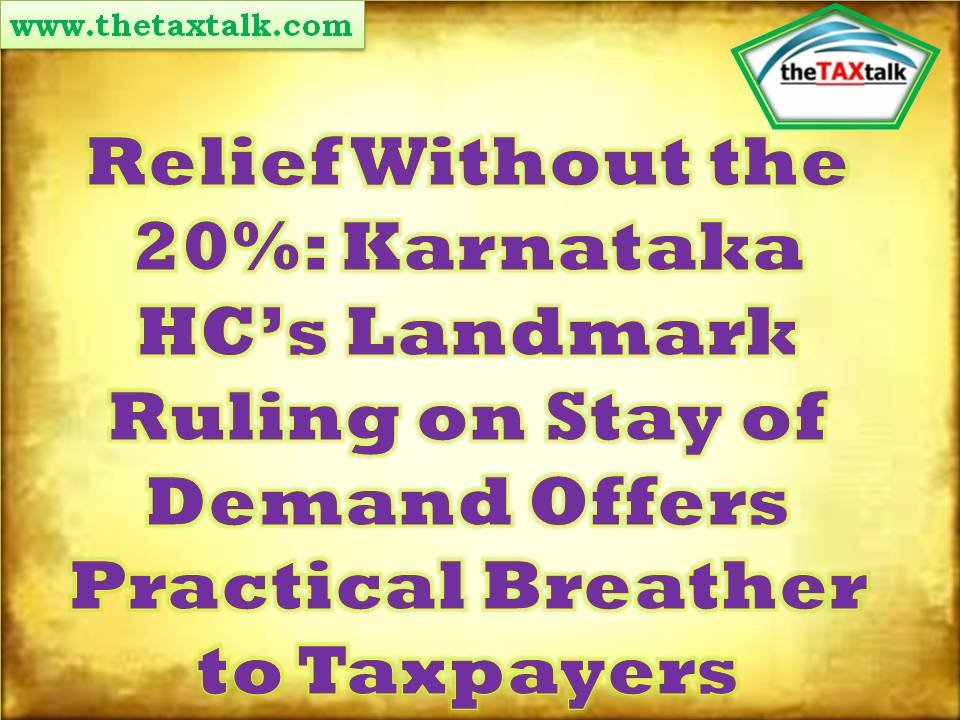![]()
Relief Without the 20%: Karnataka HC’s Landmark Ruling on Stay of Demand Offers Practical Breather to Taxpayers
Introduction
In a significant ruling that resonates with common taxpayer grievances and the principle of natural justice, the Karnataka High Court in Instakart Services (P.) Ltd. v. PCIT (Central) [2025] 175 taxmann.com 998 has clarified that the requirement to deposit 20% of the disputed tax demand-stipulated under the CBDT Circular dated 29.02.2016-is directory and not mandatory.
For Chartered Accountants, tax professionals, and businesses dealing with high-pitched assessments, this decision provides a practical roadmap to securing a stay on demand without upfront payment, provided the case merits relief.
Background: The 20% Rule
CBDT’s Circular dated 29.02.2016 was issued to standardize the stay procedure and proposed that a taxpayer seeking a stay of demand before CIT(A) should pay at least 15–20% of the disputed amount. This provision aimed to balance revenue protection and taxpayer hardship but, in practice, was often treated as a hard and fast rule.
In many cases, stay applications were rejected outright solely due to non-payment of this 20%, even when the demands were excessively high or appeals were clearly arguable.
The Facts in Instakart’s Case
Instakart Services (P.) Ltd., aggrieved by assessment for AY 2020–21, had filed an appeal and sought a stay of demand. However, the department rejected the stay application solely because the company had not deposited 20% of the disputed demand.
This prompted the company to move the Karnataka High Court under Article 226, challenging the department’s insistence on the 20% deposit as a pre-condition for stay.
The High Court’s Verdict
The Karnataka High Court, relying on its earlier judgment in the Flipkart India (P.) Ltd. case, held that:
1. The 20% rule under the CBDT Circular is not mandatory.
2. It is merely directory, and authorities must apply judicial discretionwhile deciding stay applications.
3. Mechanical rejectionof stay petitions, without examining the merits or the hardship caused to the taxpayer, is not legally sustainable.
4. The Revenue was directed not to initiate coercive action, and the Appellate Authority was asked to dispose of the appeal without insisting on the 20% payment.
The judgment emphasized that the department must consider whether:
- The assessment is high-pitched.
- There is any genuine hardship.
- Past appellate decisions favour the assessee.
Key Takeaways for Taxpayers and Professionals
1. 20% Rule is Not Absolute
This ruling cements the position that deposit of 20% of the disputed demand is not a prerequisite for stay. If the demand is:
- Excessively high,
- Likely to cause hardship, or
- Disputed on arguable and valid grounds,
then a stay can still be granted without upfront payment.
2. Speaking Orders Are Mandatory
The High Court criticized the revenue for passing non-speaking orders – decisions that lack reasoning. A cryptic rejection of a stay petition, especially when hardship is pleaded, won’t stand legal scrutiny.
This reinforces the need for authorities to record reasons, particularly while dealing with genuine hardship cases.
3. Stay Applications Need Strategic Drafting
Given the Court’s emphasis on facts, hardship, and prior favorable decisions, it’s crucial for tax professionals to:
- Highlight financial hardship, including loss of business, liquidity issues, etc.
- Demonstrate high-pitched or arbitrary assessments.
- Cite past appellate reliefs or case laws.
- Emphasize cooperation in the appeal process.
A well-drafted stay application, supported by facts and judicial precedents, enhances the chance of success.
4. No Refund Adjustment Allowed Without Due Process
The petitioner also prayed that refunds due in other years should not be adjusted against the current disputed demand. While the Court didn’t lay down a blanket rule here, the direction to stay coercive action implicitly covers such refund adjustments as well.
This offers temporary relief to taxpayers who fear losing their refunds due to ongoing disputes.
5. Expeditious Disposal of Appeals is Crucial
The Court directed the CIT(A) to dispose of the appeal within two months, recognizing that delays cause avoidable prejudice. This sets a useful precedent for taxpayers to seek time-bound disposal of appeals in similar situations.
Practical Scenario: When to Seek Relief Without 20%
Taxpayers can rely on this decision in the following scenarios:
- Startups or loss-making entitiesunable to pay 20% without crippling operations.
- Cases involving double or triple taxationdue to protective/additional assessments.
- Search/survey caseswith high additions lacking solid evidence.
- Matters where appellate relief has already been granted in earlier years.
In such cases, assessees can cite this decision and request:
- Unconditional stay,
- Refund hold protection, and
- Expeditious disposal of the appeal.
Caveat: Not a Precedent, But Highly Persuasive
While the Karnataka HC has clarified that its ruling is based on special facts and does not constitute a precedent, the reasoning aligns with general principles of fairness, justice, and proper exercise of discretion.
Therefore, even outside Karnataka, this decision holds high persuasive value and can be cited in representations before AO, Pr.CIT, or even in other High Courts.
Conclusion
The Instakart Services judgment comes as a timely reminder that tax recovery should not override taxpayer rights. The High Court has stepped in to prevent a mechanical, one-size-fits-all approach and upheld the doctrine of reasoned discretion.
For taxpayers and consultants, it offers hope, direction, and a legal foothold to challenge rigid departmental practices. And above all, it nudges the revenue machinery to act with empathy and objectivity-not merely as tax collectors, but as facilitators of justice.
The copy of the order is as under:


